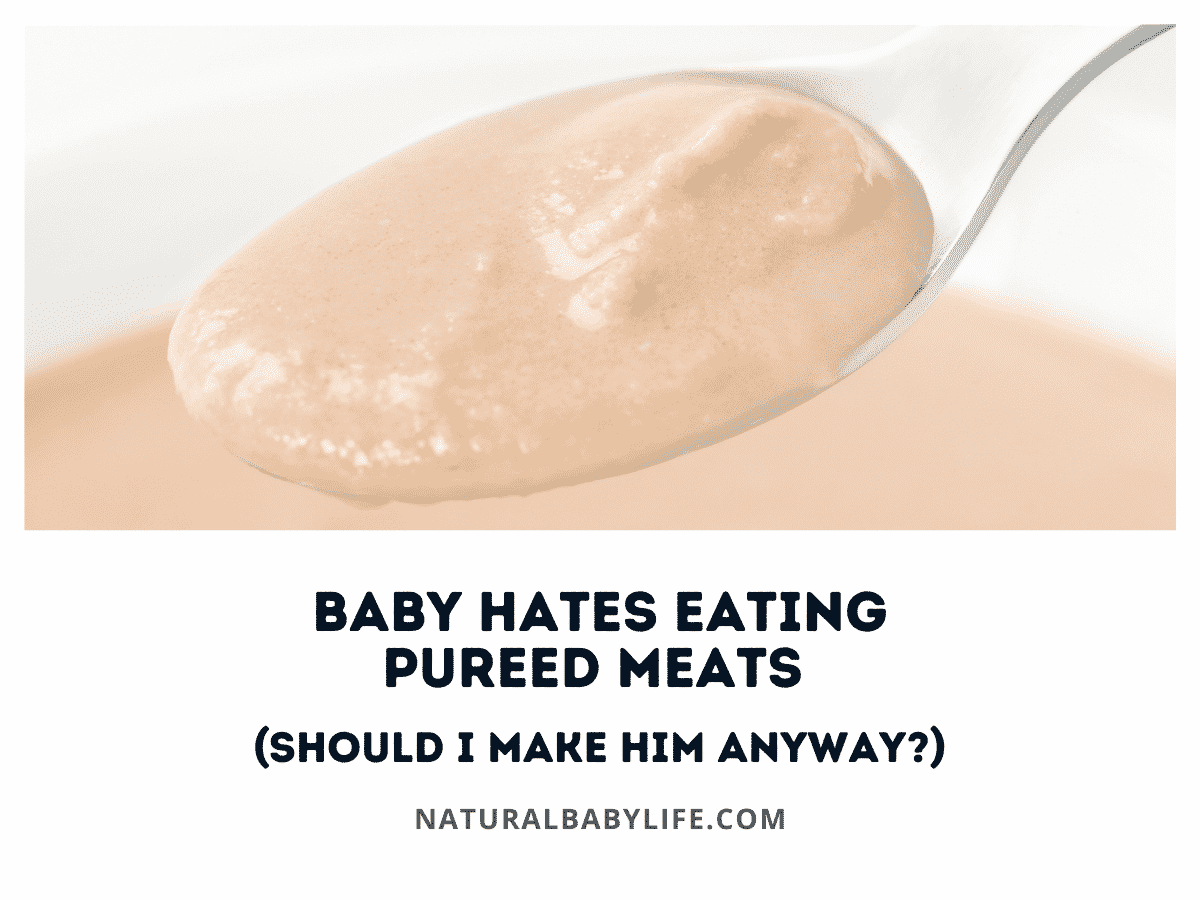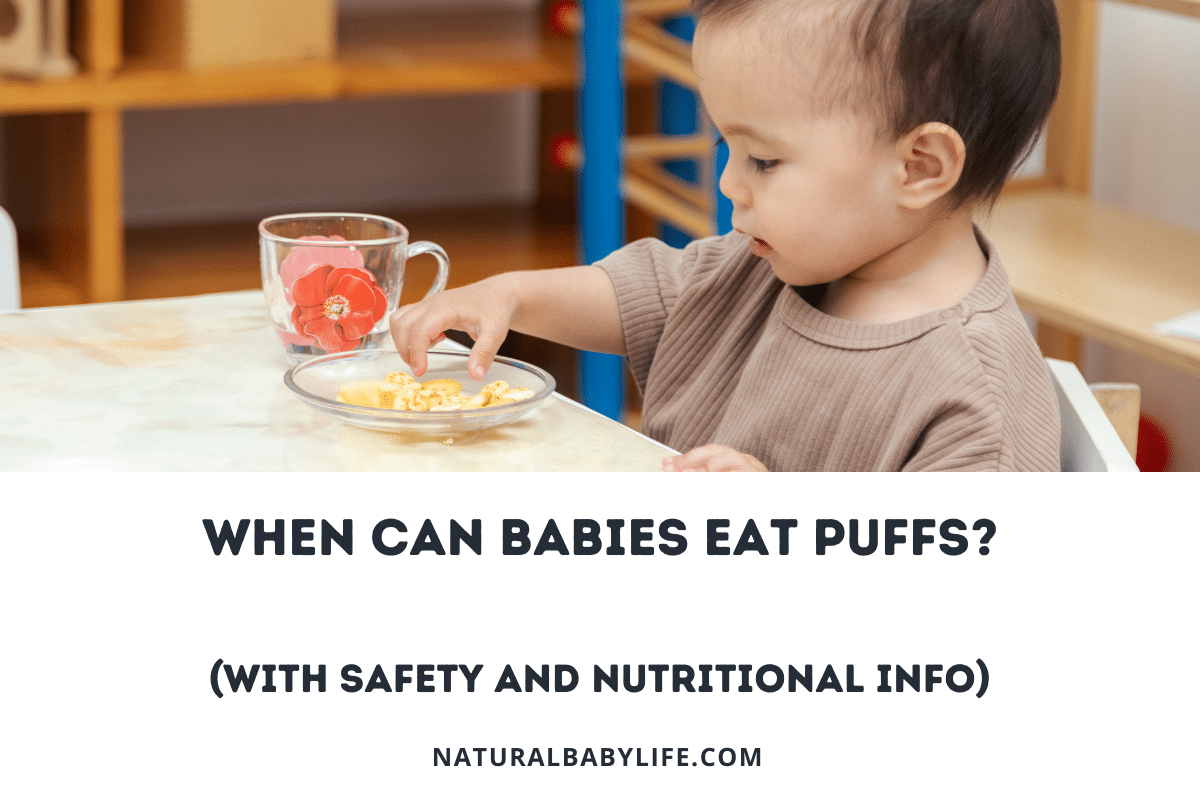Babies can be picky eaters and will often go through phases with food. One day they love a food. The next, they won’t touch it. But when it comes to meat, should you take the hint if baby keeps refusing to eat it?
If your baby doesn’t like eating pureed meats, you can try mixing it with other, sweeter baby foods or trying finger food instead, but it’s not necessary to force it. While meat provides important nutrients like iron, protein, and vitamin B12, there are many other foods such as eggs, beans, cheese, and yogurt that can meet their nutritional needs.
Keep reading for reasons your baby might not want to eat meat, what you can do to encourage them to try it, and healthy alternatives if they just don’t like it.
Table of Contents
Baby won’t eat meat baby food
Once your baby starts eating solid foods, around 4 to 6 months of age, you should make sure you introduce meat and other iron-rich foods into their diet. Iron is important as it helps with hemoglobin formation and oxygen transport.
There are two types of iron found in foods, heme iron and non-heme iron. Heme iron is the easiest for the body to absorb, and is found in animal products like red meat, seafood, and poultry. Non-heme iron is found in foods like tofu, beans and lentils, dark green leafy vegetables, and iron-fortified infant cereals.
Non-heme iron is found in plants and iron-fortified products, and while it is not as easily absorbed by the body, you can still provide baby with enough iron by making thoughtful food choices.
In addition to providing iron for baby, meats also provide zinc, vitamin B12, fats, and protein. If baby is fed a well-rounded diet, then her protein needs can be met with eggs, dairy, beans, nuts, and soy products as an alternative to meat.
However, sometimes babies just don’t like to eat meat, whether pureed or finger food. This can cause concern for a lot of parents, but luckily there are some things you can do if your baby refuses meat.
Baby hates pureed meat
It’s possible that baby doesn’t like pureed meat, not because of the taste necessarily, but rather the texture or consistency of the puree.
If your baby consistently refuses the pureed meat, not to worry. Once she has developed fine motor skills like the pincer grasp, she can start to pick up small pieces of food and feed herself so you can move on from pureed foods.
The pincer grasp is when your baby can pinch things between her thumb and pointer finger and usually develops at around 9 months.
How do I introduce meat to my baby’s diet?
When introducing meat to your baby, preparation is key.
If you are giving baby meat purees, you can try serving it by itself or mixing it with naturally sweet vegetables like sweet potato or carrots.
When you start giving baby small pieces of meat to eat, keeping it tender and moist is a good idea. Not only will this make it taste better, but it will also make it much easier for you baby to eat. One of the easiest combinations is mixing ground meat in tomato sauce.
Do babies need to eat meat?
If your baby doesn’t like to eat meat, there are some other ways to get him the nutrients he needs. Meat provides baby with iron, protein, and vitamin B12. To meet their nutritional needs without meat, you can balance their diet by mixing other foods.
Instead of meat, you can provide your baby with important nutrients by through these foods:
- Iron: dark leafy greens, beans, fortified and enriched foods, and soybeans
- Protein: eggs, dairy, beans, nuts and nut butters, and soy products including tofu
- Vitamin B12: certain fortified foods, eggs and dairy
When can babies start eating meat purees
Babies can start eating meat purees when they begin eating solids. For most babies, this occurs around 4 to 6 months of age, but is different for each baby.
Your baby is probably ready to start eating solids when he can support his own head and seems interested in food. Maybe he stares at your food or even tries to grab for it at the dinner table.
If your baby seems frustrated or not really interested in food, you may want to take a pause with solid foods and try again a few days or weeks later.
When can babies eat solid meats
Babies can begin to eat solid meats once they begin eating solid finger foods. This usually occurs for babies around 9 months of age, or when baby has developed fine motor skills to pick up small pieces of food.
You will want to make sure the meat that you offer them is easy to chew, especially if they don’t have molars yet. Ground meat is the easiest to start with, rather than chewy meats like steak.
How to get a child to start eating meat
If baby doesn’t like meat purees, you can try a few things to encourage them to eat the puree, including mixing it with other purees they already like, adding spices for a more interesting flavor, or offering baby a different texture like minced meat instead of pureed meat.
Mix meat with other purees
Sometimes mixing the meat in with other purees can entice baby to eat it, particularly if it is a puree they already know and love.
Some favorite purees to mix meat in with include sweet potato, carrots, and tomatoes.
Add spices to meat puree
Changing up the flavor by adding spices to the meat puree is another option for baby if he doesn’t like the meat puree.
Spices are great to encourage exposure to different tastes as well. But remember – a little bit goes a long way. Some great spices to experiment with include cinnamon, turmeric, nutmeg, cardamom, cumin, coriander, clove, smoked paprika, mint, basil, dill, and rosemary.
Not all spices should be added though. Added salt or sugar is not recommended for babies under 12 months old.
Feed baby minced meat instead of purees
Another option for feeding baby meat is to give them minced or finely chopped meat. This can be a good option for putting the meat in a sauce, salsa, or yogurt to give it more flavor. When baby starts to eat solids around 6 months of age, they can eat finely minced meat.
Give baby finger food instead of pureed meat
If the texture of the pureed meat is part of the reason why your baby doesn’t like eating meat, you can give baby small pieces of meat once they are ready for finger foods.
Solid foods can be given once babies can sit up independently, generally around 6 months of age. As their oral skills continue to develop, you can gradually increase the thickness and lumpiness of food, starting with pureed and mashed to chopped and diced foods. Usually around 9 months of age, when baby develops the appropriate fine motor skills to pick up food, he will be ready to eat finger foods.
Try different kinds of meat
You can always try different meats to see which baby prefers.
Ground meat, whether beef, chicken, or turkey, is usually the easiest type to start with for babies. It’s much easier to chew with their gums. Another good option is pulled meat that has been cooked in a slow cooker so it’s very tender.
Chewier meats like steak should be avoided.
What to feed a child who doesn’t like meat?
Meat provides some essential nutrients important to your baby’s health and overall development. This includes iron, protein, and vitamin B12.
However, if baby just doesn’t like meat, feeding them foods such as eggs, dairy, beans, nuts and nut butters, and dark leafy greens can help provide baby with the nutrients they would be getting from meat.
How much protein does baby/toddler need
The amount of protein the Institute of Medicine recommends a child gets depends on their age.
Babies should get this much protein each day:
- 0 to 6 months: at least 9.1 grams of protein per day
- 7 to 12 months: at least 11 grams of protein per day
- 1 to 3 years old: at least 13 grams of protein per day
To put those numbers into perspective, one egg contains 6 grams of protein.
Meat alternatives for baby food
If meat is not going to be an option for your baby, there are several alternatives that you can give to baby to meet their nutritional needs.
Instead of meat, try feeding your baby eggs, milk, cheese, yogurt, beans, chickpeas, and even lentils. When you are offering these alternatives, it’s a good idea to vary what you offer to help your baby learn to like a wide range of foods. In fact, just because she doesn’t like it the first time, doesn’t mean you should stop trying.
Your perseverance will probably pay off since it can take 10 or more tries before a child will accept a new food.
Eggs
Eggs can be a great substitute for meat since one egg provides 6 grams of protein. And, there are so many ways to incorporate eggs into a baby’s diet, whether it be scrambled eggs, hard-boiled eggs, or even french toast!
Full-fat milk, cheeses, and yogurts
Full-fat milk, cheeses, and yogurts are very kid-friendly and can provide between 4 and 20 grams of protein depending on which dairy product you choose.
Beans
Beans are a common alternative and what’s nice is that there are a lot of different beans you can offer, so you can keep their meals varied. As far as protein goes, one cup of beans is 15 grams of protein, so it will easily meet the recommended amount.
Chickpeas
Chickpeas can be given as an alternative to meat. The most common way to give babies chickpeas is in the form of hummus. One cup of chickpeas will provide 12 grams of protein for baby.
Lentils
It’s very easy to mash up lentils and mix them with a puree or include them in a soup. They are rarely responsible for an allergic reaction, which makes them a nice alternative to meat. One cup of lentils provides 18 grams of protein.










